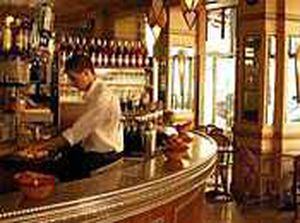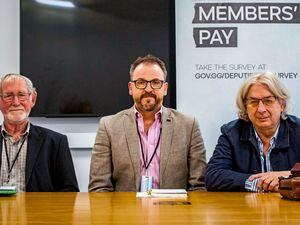Eating their words
Time was when it would have been hard to have a bad meal there, but now it seems it's increasingly difficult to find a good one. France, traditionally renowned for its food and wine, is in the culinary doldrums. Could it be a case of fish and chips triumphing over foie gras?

I FIRST went to the glorious French city of Strasbourg in the early 1980s as a guest of the European Parliament. Very much aware that it had no place in the consciousness of the majority of its electorate, the parliament subsidised journalists from member countries to attend the monthly sessions.
It wasn't exactly part of the infamous European gravy train: the EU stumped up an airfare and a smallish contribution towards hotel expenses and that was it.
When I arrived at my hotel, there was a note asking me to ring Madron Seligman, the Conservative MEP for West Sussex.
Seligman was more or less unknown in his constituency. Indeed, in Chichester's shopping precinct, I did a TV news vox pop (interviews with people in the street) asking if anyone recognised his name. None did. In true blue Sussex, anyone with a Conservative tag in those days was elected with a huge majority, no matter who he or she was.
Along with his wife, Seligman invited me to Au Crocodile, one of Strasbourg's most expensive and well-known restaurants, which had been awarded three Michelin rosettes.
Looking back, I realise I was a willing, if unwitting, recipient of wholly indefensible expenses. The meal we had was superb and the European Parliament had paid for it all.
Still, never mind the ethics – it was all a long time ago and it was the one and only time I've eaten in a three-Michelin-rosette establishment. In the whole of France, including Paris, there are fewer than 30 such restaurants. Such is the importance attached to the Michelin rating, one of the country's most famous chefs, Bernard Loiseau, is said to have committed suicide in 2003 because that year his restaurant La Cote d'Or in Burgundy, was reduced to two rosettes.
Food is part of France's culture and is probably the biggest reason why most Francophiles frequent the country. Searching out the best places to eat is a huge part of anybody's holiday there.
For their part, the French themselves have historically panned food produced by the British on the other side of the Channel.
There was that memorable occasion ahead of the 2005 G8 summit in Scotland when the French president, Jacques Chirac, was overheard denigrating British cooking.
'One cannot trust people whose cuisine is so bad. The only thing they have done for European agriculture is mad cow disease.'
And when Lord George Robertson – the former secretary-general of NATO who's Scottish – made him try a local dish, Chirac remarked: 'This is where our difficulties with NATO come from.'
In a new book entitled Au Revoir to All That, Michael Steinberger, the American journalist and food writer, says Chirac's comments show he was completely divorced from reality. Just months before he uttered them, Gourmet magazine had declared London to be 'the best place to eat in the world right now'.
Only days after Chirac's gibes had made the headlines, members of the International Olympic Committee, despite having been wined and dined for months by French officials, selected London over Paris for the 2012 Olympic Games. A win for fish and chips over foie gras.
Other indignities followed. New York's French Culinary Institute, one of America's foremost cooking schools, marked the opening of its new international culinary centre with a two-day festival. The institute brought 10 eminent foreign chefs to New York – and not one was French.
In fact, all were Spanish.
Is Steinberger right to claim that where 25 years ago it was difficult to eat badly in France, today it's tough finding a decent baguette?
Certainly, thousands of bistros, cafes and restaurants are closing down in France each year. By contrast, le Big Mac is becoming hugely popular in the country that has become McDonald's second most profitable market in the world.
In an attempt to shore up an industry which has lost between 20% and 50% of its income, President Sarkozy has pushed through a VAT reduction on restaurant bills. Already suffering from the strength of the euro against the pound, restaurateurs are hoping lower prices will lure back some of their tourist customers.
The lowering of VAT on meals, however, doesn't apply to wine and the French wine industry continues to be a huge concern across the country. The latest consumer research into supermarket and off-licence trade suggests that UK customers are continuing to shy away from French wine. We now buy more Australian, Italian, American and South African wine than French.
South African wines have been particularly popular because the rand is weaker than the pound. Demand for
Chilean wine is also rising and could soon put France into sixth place.
Tesco and Morrisons are heading a consortium to advise the French government what to do about the increasing unpopularity of French wine. The supermarket chains say the French need to change the way they promote their wines in the UK if they're ever to regain or stabilise their market share.
Part of the trouble is that French wine regions are at war with themselves. Graham Nash of Tesco said: 'In France there are disputes within regions as well as between them... much better progress could be achieved from the regions working together.'
The French regions refuse to cooperate with each other.
And as if these French institutions coming under attack wasn't bad enough, there's talk of Joan of Arc about to meet her fate again at the hands of the English. The French daily Le Monde says the French Navy is appalled that its much-loved ship, the Jeanne d'Arc, may be sent to England to be broken up after being decommissioned later this year.
'The sailors see their beloved Jeanne burnt, martyrised and dismembered a second time by the British ... sad, painful, unimaginable,' reported Le Monde.
Oh dear, the French are in the doldrums, aren't they?
Nevertheless, a Michelin rosette or two still speaks volumes to me – and, dare I say it, especially if someone else is paying.





